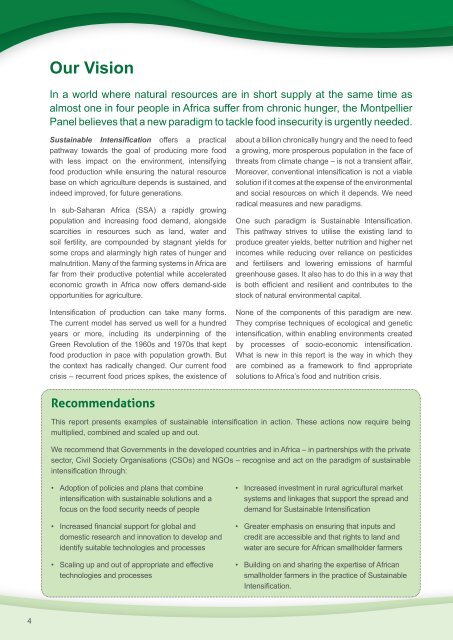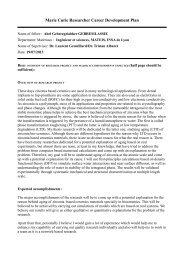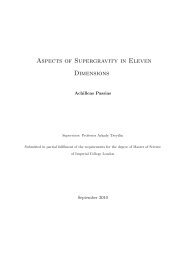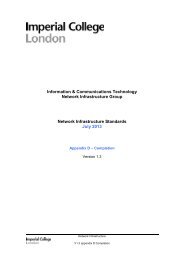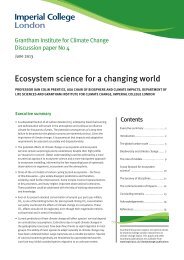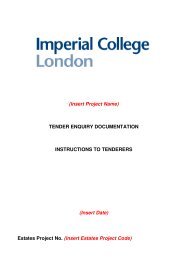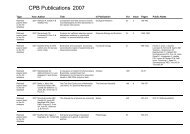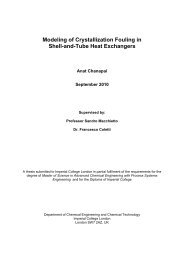Sustainable Intensification: - Workspace - Imperial College London
Sustainable Intensification: - Workspace - Imperial College London
Sustainable Intensification: - Workspace - Imperial College London
You also want an ePaper? Increase the reach of your titles
YUMPU automatically turns print PDFs into web optimized ePapers that Google loves.
4<br />
Our Vision<br />
In a world where natural resources are in short supply at the same time as<br />
almost one in four people in Africa suffer from chronic hunger, the Montpellier<br />
Panel believes that a new paradigm to tackle food insecurity is urgently needed.<br />
<strong>Sustainable</strong> <strong>Intensification</strong> offers a practical<br />
pathway towards the goal of producing more food<br />
with less impact on the environment, intensifying<br />
food production while ensuring the natural resource<br />
base on which agriculture depends is sustained, and<br />
indeed improved, for future generations.<br />
In sub-Saharan Africa (SSA) a rapidly growing<br />
population and increasing food demand, alongside<br />
scarcities in resources such as land, water and<br />
soil fertility, are compounded by stagnant yields for<br />
some crops and alarmingly high rates of hunger and<br />
malnutrition. Many of the farming systems in Africa are<br />
far from their productive potential while accelerated<br />
economic growth in Africa now offers demand-side<br />
opportunities for agriculture.<br />
<strong>Intensification</strong> of production can take many forms.<br />
The current model has served us well for a hundred<br />
years or more, including its underpinning of the<br />
Green Revolution of the 1960s and 1970s that kept<br />
food production in pace with population growth. But<br />
the context has radically changed. Our current food<br />
crisis – recurrent food prices spikes, the existence of<br />
Recommendations<br />
about a billion chronically hungry and the need to feed<br />
a growing, more prosperous population in the face of<br />
threats from climate change – is not a transient affair.<br />
Moreover, conventional intensification is not a viable<br />
solution if it comes at the expense of the environmental<br />
and social resources on which it depends. We need<br />
radical measures and new paradigms.<br />
One such paradigm is <strong>Sustainable</strong> <strong>Intensification</strong>.<br />
This pathway strives to utilise the existing land to<br />
produce greater yields, better nutrition and higher net<br />
incomes while reducing over reliance on pesticides<br />
and fertilisers and lowering emissions of harmful<br />
greenhouse gases. It also has to do this in a way that<br />
is both efficient and resilient and contributes to the<br />
stock of natural environmental capital.<br />
None of the components of this paradigm are new.<br />
They comprise techniques of ecological and genetic<br />
intensification, within enabling environments created<br />
by processes of socio-economic intensification.<br />
What is new in this report is the way in which they<br />
are combined as a framework to find appropriate<br />
solutions to Africa’s food and nutrition crisis.<br />
This report presents examples of sustainable intensification in action. These actions now require being<br />
multiplied, combined and scaled up and out.<br />
We recommend that Governments in the developed countries and in Africa – in partnerships with the private<br />
sector, Civil Society Organisations (CSOs) and NGOs – recognise and act on the paradigm of sustainable<br />
intensification through:<br />
• Adoption of policies and plans that combine<br />
intensification with sustainable solutions and a<br />
focus on the food security needs of people<br />
• Increased financial support for global and<br />
domestic research and innovation to develop and<br />
identify suitable technologies and processes<br />
• Scaling up and out of appropriate and effective<br />
technologies and processes<br />
• Increased investment in rural agricultural market<br />
systems and linkages that support the spread and<br />
demand for <strong>Sustainable</strong> <strong>Intensification</strong><br />
• Greater emphasis on ensuring that inputs and<br />
credit are accessible and that rights to land and<br />
water are secure for African smallholder farmers<br />
• Building on and sharing the expertise of African<br />
smallholder farmers in the practice of <strong>Sustainable</strong><br />
<strong>Intensification</strong>.


